Thailand’s economy grew just 2.5% in 2024, and forecasts for 2025 hover around 1.8–2.2%. Exports and cash handouts gave last year a surprise bump, but headwinds like global trade tensions and weak tourism have kept growth sluggish. To change gears, Bangkok is unleashing a flurry of measures. The Board of Investment will fast-track projects worth ฿300 billion to “revive a sluggish economy”, and a year-end stimulus package hopes to juice domestic spending. Even so, the mood is cautious – as one analyst warns, “Unless these legal obstacles are addressed, Thailand risks falling behind its regional peers in securing strategic foreign investment”.
“Thailand is trying to become more competitive by creating smarter, more modern rules.”
Against this backdrop, policymakers are flirting with reform. In April 2025 the Cabinet agreed to raise foreign equity caps and streamline approvals for once-closed sectors. After 25 years of a strict 49% ownership limit, officials now speak of shifting from “protection” to “building competitive potential” for the economy. The goal is to eliminate nominee ownership schemes and let foreign investors take clearer stakes in Thai firms. However, details remain sketchy and growth forecasts have already been cut (2025 GDP is now seen near 2.1%). In short, the government is betting that “smarter, more modern rules” can lure capital – but the risks of falling behind neighbours are very real.
Streamlined Visas – But Keep Your Long-Term Permit
Thailand has also overhauled its visa system. In late 2025 the 17 non-immigrant visa categories were consolidated into just seven. Officials stress that this is mostly a reclassification: “Bottom line: This is taxonomy reform, not a new immigration regime”. In practice, expats who qualified before will usually qualify under the new scheme – the eligibility criteria didn’t loosen much, only the labels changed. The aim is clearer processing, but missteps could still cause trouble with renewals or document checks.
“All Thai banks…have become more stringent with their KYC requirements and have been limiting transactions, especially for accounts opened under tourist or DTV visas.”
There’s a catch: Thai banks have responded to the visa shuffle by tightening account rules. In 2025 almost every major Thai bank stopped opening accounts for tourists and even visa-holders under the new Digital Tourist Visa (DTV). Nowadays you need a genuine long-term visa – such as a work permit, a marriage/retirement visa, or the new 10-year Long-Term Resident (LTR) visa – plus paperwork, to qualify for banking services. (Banks like Bangkok Bank, once friendly to foreigners, now insist on proof of stable status for all accountholders.) In short, the entry bar has actually risen: get the right visa, or you’ll find the banking system closed off.

A New Boom for Expats and Travelers?
Despite these hurdles, Thailand is rolling out the welcome mat in other ways. The Tourism Council estimates 33.1 million foreign visitors in 2025, close to pre-pandemic levels. The government plans fresh travel incentives and a 10-year resident visa to encourage spending. Board of Investment officials are courting entrepreneurs, and even domestic tourism is getting a reboot – on Oct 17, 2025 a Reuters dispatch noted the cabinet was introducing “new incentives to boost domestic travel, the latest in a series of measures aimed at lifting growth above 2.2% this year”.
Thailand’s destinations themselves remain a draw. As The Thailand Advisor has observed, places like “Phuket and Samui attract global tourists and luxury buyers, Hua Hin draws retirees and investors, while Chiang Mai offers culture and creativity at lower costs.” The opportunities cut both ways. Western expats looking for property or businesses can now search listings on portals like Lazudi for Bangkok condos or beachside hotels. Online travel platforms like Expedia offer flight+hotel deals to get you there. Entrepreneurs can enlist Siac Consulting to handle company setup, BOI registration, and visas. Digital nomads staying connected can buy Breeze eSIM plans that work nationwide. From beachside co-working cafés to condo investments, Thailand is banking on a new wave of foreign participation.

The Thailand Advisor: We believe our readers aren’t just spectators – you’re part of Thailand’s story. We stand for clear, data-driven analysis and a community spirit. Think of this report as advice from one expat to another: stay curious and involved. Subscribe to join our network and make your voice count in Thailand’s future.
Read next: Thailand’s Visa Overhaul 2025: 17 Categories Down to 7 — What Really Changes for Expats.










